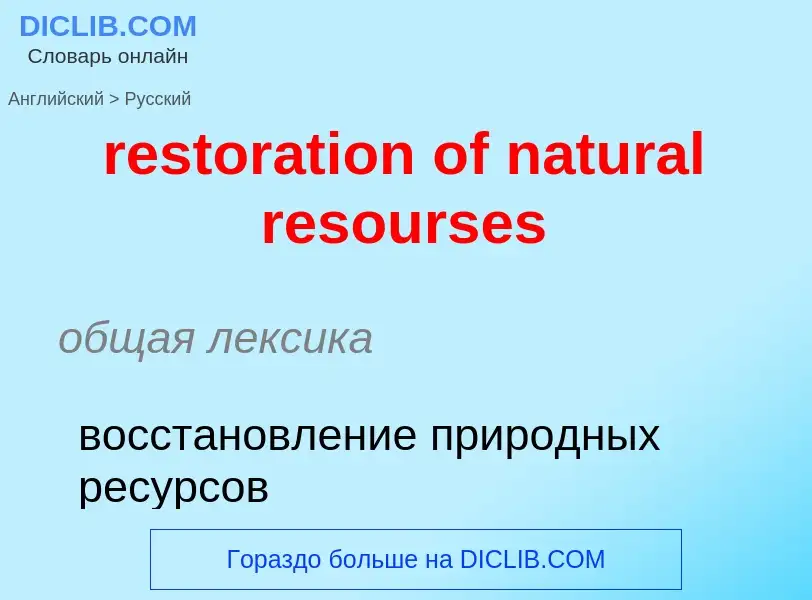Traducción y análisis de palabras por inteligencia artificial ChatGPT
En esta página puede obtener un análisis detallado de una palabra o frase, producido utilizando la mejor tecnología de inteligencia artificial hasta la fecha:
- cómo se usa la palabra
- frecuencia de uso
- se utiliza con más frecuencia en el habla oral o escrita
- opciones de traducción
- ejemplos de uso (varias frases con traducción)
- etimología
restoration of natural resourses - traducción al ruso
общая лексика
восстановление природных ресурсов
Definición
.
Wikipedia

Restoration ecology is the scientific study supporting the practice of ecological restoration, which is the practice of renewing and restoring degraded, damaged, or destroyed ecosystems and habitats in the environment by active human interruption and action. Effective restoration requires an explicit goal or policy, preferably an unambiguous one that is articulated, accepted, and codified. Restoration goals reflect societal choices from among competing policy priorities, but extracting such goals is typically contentious and politically challenging.
Natural ecosystems provide ecosystem services in the form of resources such as food, fuel, and timber; the purification of air and water; the detoxification and decomposition of wastes; the regulation of climate; the regeneration of soil fertility; and the pollination of crops. These ecosystem processes have been estimated to be worth trillions of dollars annually. There is consensus in the scientific community that the current environmental degradation and destruction of many of Earth's biota are taking place on a "catastrophically short timescale". Scientists estimate that the current species extinction rate, or the rate of the Holocene extinction, is 1,000 to 10,000 times higher than the normal, background rate. Habitat loss is the leading cause of both species extinctions and ecosystem service decline. Two methods have been identified to slow the rate of species extinction and ecosystem service decline, they are the conservation of currently viable habitat and the restoration of degraded habitat. The commercial applications of ecological restoration have increased exponentially in recent years. In 2019, the United Nations General Assembly declared 2021–2030 the UN Decade on Ecosystem Restoration.


![Johnson Creek]], to restore [[bioswale]] and flood control functions of the land which had long been converted to pasture for cow grazing. The horizontal logs can float, but are anchored by the posts. Just-planted trees will eventually stabilize the soil. The fallen trees with roots jutting into the stream are intended to enhance wildlife habitat. The meandering of the stream is enhanced here by a factor of about three times, perhaps to its original course. Johnson Creek]], to restore [[bioswale]] and flood control functions of the land which had long been converted to pasture for cow grazing. The horizontal logs can float, but are anchored by the posts. Just-planted trees will eventually stabilize the soil. The fallen trees with roots jutting into the stream are intended to enhance wildlife habitat. The meandering of the stream is enhanced here by a factor of about three times, perhaps to its original course.](https://commons.wikimedia.org/wiki/Special:FilePath/Johnson creek pasture reclamation P2222.jpg?width=200)
![Ecosystem restoration for the [[superb parrot]] on an abandoned railway line in Australia Ecosystem restoration for the [[superb parrot]] on an abandoned railway line in Australia](https://commons.wikimedia.org/wiki/Special:FilePath/Regenerated habitat for superb parrot on the abandoned Boorowa railway line.jpg?width=200)
![Forest restoration in action at the [[Buffelsdraai Landfill Site Community Reforestation Project]] in South Africa Forest restoration in action at the [[Buffelsdraai Landfill Site Community Reforestation Project]] in South Africa](https://commons.wikimedia.org/wiki/Special:FilePath/Restoration in action at Buffelsdraai.jpg?width=200)
![Restored [[prairie]] at the West Eugene Wetlands in [[Eugene, Oregon]] Restored [[prairie]] at the West Eugene Wetlands in [[Eugene, Oregon]]](https://commons.wikimedia.org/wiki/Special:FilePath/Restored Prairie at the West Eugene Wetlands (8745659774).jpg?width=200)
